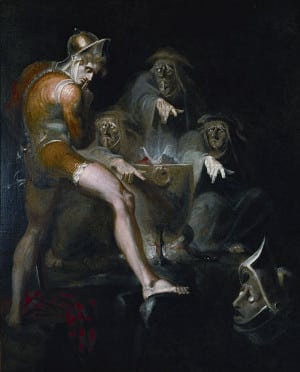What caused Macbeth’s inevitable catastrophe? Was it what he experienced from a series of external forces, or his choice of reaction to them? One may believe that Macbeth was under the mere perception of free will or he was controlled by other deities. This is simply not true. Macbeth was, unfortunately, a victim of his own free will due to his conscious thought processes, disregard of contrasting influences, and his personal objectives and intentions.
In the first act of Macbeth, Macbeth had contemplated on whether or not he should murder Duncan to gain the throne. Prior to this, Macbeth became the thane of Cawdor (as the prophecy foretold), this gave him the impression that he would eventually become king.
From greed and excitement, Macbeth continued to contemplate whether his crowning would occur “without [his] stir” (1.3.143). Although the first portion of the prophecy occurred without his doing, his ambition impulsively leads him to the initial thought of murdering Duncan.
Due to the fact that he became the thane of Cawdor without action, Macbeth should have assumed the same would occur to become king. However, he consciously gains murderous intentions unprovoked and thus from his own free will. Then again if Macbeth was not given contrasting information his bias would perpetually fuel itself and cause the murder to be instinctual, not of free will.
Yet Macbeth was given contrasting information to provide resistance to his biased disposition! After Macbeth was told of the prophecies regarding himself and Banquo and became the thane of Cawdor, Banquo discovered that the prophecies contained an aura of equivocation. Being close friends with Macbeth and realizing the possible outcomes in the future, Banquo warned Macbeth, “The instruments of darkness tell us truths, / Win us with honest trifles, to betray’s / In deepest consequence” (1.3.125-127).
After being told that there may be an insidious outcome of the prophecies, Macbeth consciously disregarded this warning to focus on how he would eventually gain the power to the throne. After a prolonged period of contemplating killing Duncan, Macbeth’s subconscious caused him to hallucinate and envision a dagger pointing towards the king’s bedroom.
Unfortunately, Macbeth acted on this vision that was created by his own contemplations and made the final decision to murder Duncan. If it were not for his overbearing desire from his internal temptations Macbeth may have considered other options and not murder Duncan; regardless, he freely continued to ponder and entertain the idea of homicide and commit the horrid action.
Although the evidence that Macbeth acted on free will is irrefutable, some still believe that he was forced into committing these actions and was under the mere perception of free will. No matter the fact that Shakespeare wrote Macbeth, it is completely absurd to simply draw the conclusion that Shakespeare made Macbeth perform these acts; Shakespeare clearly wrote Macbeth in a way in which Macbeth was influenced by objectives and intentions in each scene creating a reality of free will within the character of Macbeth.
Those whose thoughts are contrasting yet far less ridiculous, provide that Macbeth was influenced by three witches who foresaw the future and manipulated the outcomes of Macbeth’s actions by causing him to see visions that “As by the strength of their illusion / Shall draw him onto his confusion” (4.5.28-29).
Although this is true, these three witches influenced Macbeth and simply tricked him into performing his insidious actions on his own accord without the thought of negative repercussions. Thus Macbeth constantly had the ultimate control of his own actions and chose them according to his objectives and intentions.
The tragic hero, Macbeth, unfortunately, fell under his own autonomy due to his contemplations, disregard of opposing encouragements, and his given objectives and intentions. No matter how one may imagine Macbeth, his actions were of his own accord regardless of external motivators. Due to the fact, Macbeth was autonomous, his character provides the theme in relevance; and that theme is that virtually everyone, fictional or not, is responsible for their own actions.
Works Cited
Shakespeare, William. Macbeth. Prentice Hall Literature: The British Tradition. Boston:
Pearson Prentice Hall, 2007. 306-394. Print.

